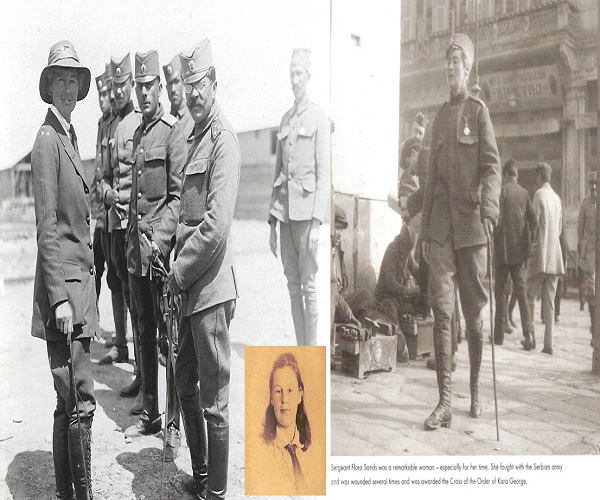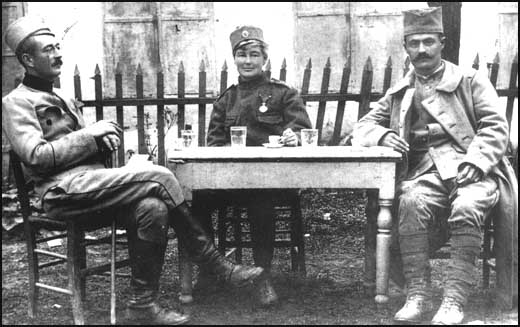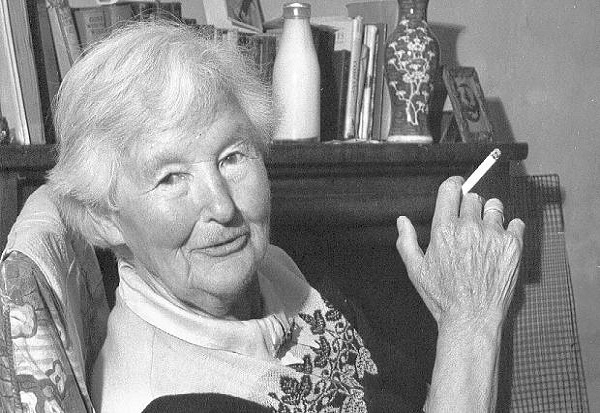
Daughter of the Suffolk rector, Flora Sandes received the upbringing any middle-class girl would have had in her time – hope for a good husband and start a family when in the right age. However, she spent her childhood dreaming of becoming a soldier and when old enough, Flora Sandes went on to realize her dream becoming the only female to participate in action in the frontlines of WWI and WWII.
Flora Sandes was born in 1876 at North Yorkshire the youngest among a brood of eight. Her father was a rector. When Flora reached nine, her father moved the large family to Suffolk. Flora’s childhood years were typical for someone in her standing – a governess and a spell in a finishing school. But instead of dreaming on getting herself a husband and building a good life with him and having children, the girl yearned for adventure and wanted to be a soldier.
That was quite a surprise. How can a girl of her background and training have such a maverick spirit?
As Louise Millar, the official biographer of Flora Sandes, women in those days were wonted on leading lives with reserved respectability enjoying tea parties and playing tennis. However, to Flora who was a tomboy, these things held no color compared to daydreaming about fighting in a battle while riding through the countryside on a horse.
She trained as a stenographer in London after which she scraped every penny of her wages as well as the legacy a rich uncle left her to head of and explore the world.
She came to Cairo working as a secretary, enjoyed life outdoors in British Columbia in Canada and even had to shot a man in self-defense while working and travelling in America.
Flora Sandes was 38 years old when war broke out between Britain and Germany in 1914. She was living in London at that time with her elderly father and a 15-year-old nephew Dick. She enlisted to be an ambulance service volunteer and merely eight days after she did so, she was travelling to Serbia together with the first volunteer unit to leave Britain.
She originally worked for the Red Cross. However, she soon signed up for the Serbian army which was one of the few commands in the world to accept female soldiers.
Shying not away from frontline action, she made a name for herself within Serbia’s armed forces and was speedily moving up in ranks. From being a private, Flora Sandes became a corporal and then a sergeant-major.
It wasn’t just in soldiering that she showed herself equal with her male counterparts. Even in masculine pursuits like racing cars, smoking, drinking and shooting, her male comrades could expect a fair game from Flora Sandes.

In one instances, Flora was hit by by a grenade while engaged in a hand-to-hand combat trying to defend her position. A lieutenant in her company saved her by risking his own life crawling though under fire just so he could drag her into safety.
The exceptional bravery Flora Sandes showed in war earned her a medal. She also made headlines across the globe. But the recognition did not came without a price. A shrapnel teared the flesh of her back and ran from her knee up to her shoulder on the right side of her body. Her right arm was also badly broken and lacerated.
Nevertheless, she still rejoined the men fighting in the frontline trenches the moment she was given a clean bill of health. She fought side-by-side with them helping them regain the country they ad lost some three years earlier. She even was strong enough to survive Spanish influenza.
Accroding to Millar, Flora Sandes was addressed as “brother” by the soldiers in her company as they saw her an honorary man and a good soldier.
She further added that Serbia was the only country which allowed women to do as they pleased. She cited two factors why Serbians let women into the army – one, because they didn’t know what to do with them and two, their need for more soldiers was so great having women in was a desperate measure to keep their numbers up.
When the Great War ended, Flora Sandes opted to stay in the army saying that she never loved anything so much in her life that soldiering.
But when she was disarmed in 1922, Flora Sandes had to deal with being a civilian woman once more and readjust. She had dejectedly remarked about putting on woman clothes for the first time in years and cowering on the streets.
She traveled in between Serbia and London for a couple of years until she found love in the person of Yuri Yudenitch who was a handsome and educated “white Russian officer”. Yuri served as one of her sergeants before and was 12 years her junior.
They got married in 1927 and moved to the new kingdom of Yugoslavia two years later.
But then, tensions once again rose not allowing the couple to enjoy a peaceful life together. The Nazis’ invasion happened on April 1941. Four days after, Flora Sandes donned on her uniform and marched off to fight. She was already 65.
However, her old war wound had put a stop to her plans just within days after rejoining the Yugoslav army. It took 11 days for the Nazis to defeat the Yugoslav army and seize over the country.
She was incarcerated by the German’s political police, the Gestapo. She was freed after seven days but had to report to the Gestapo’s office once every week. Unfortunately, her husband died due to heart failure in 1941.
Flora Sandes was alone and penniless when WWII ended. She remained indomitable though. She moved to stay with her nephew in Jerusalem and then to Rhodesia (Zimbabwe). At the age of 70, she raised gossips in the country by drinking and smoking with the black peasant population.

She was becoming nostalgic for the war as time passed by. She always looked forward for the Salonika Reunion Association’s annual gathering where she was a heroine.
Ultimately, she returned to Suffolk and was bounded in an electric wheelchair. She used the contraption to travel between the local villages often setting it off at full speed allowing her hair to be blown by the wind.
Flora Sandes passed away on November 24, 1956 after a brief bout with “obstructive jaundice”. She was 80 years old. Even in her deathbed, she had dreamed of travelling still as she had renewed her passport shortly before she died.
As her biographer Louise Millar puts it, Flora Sandes was a more modern woman in today’s sense. She lived as she wanted, doing things as she dreamed and was the ultimate proof that women could do just about anything if they put their hearts and minds in it.
Flora Sandes also was one of the factors that shifted the world’s perception of the gentler sex. By pushing all the boundaries, Flora Sandes became a heroine.